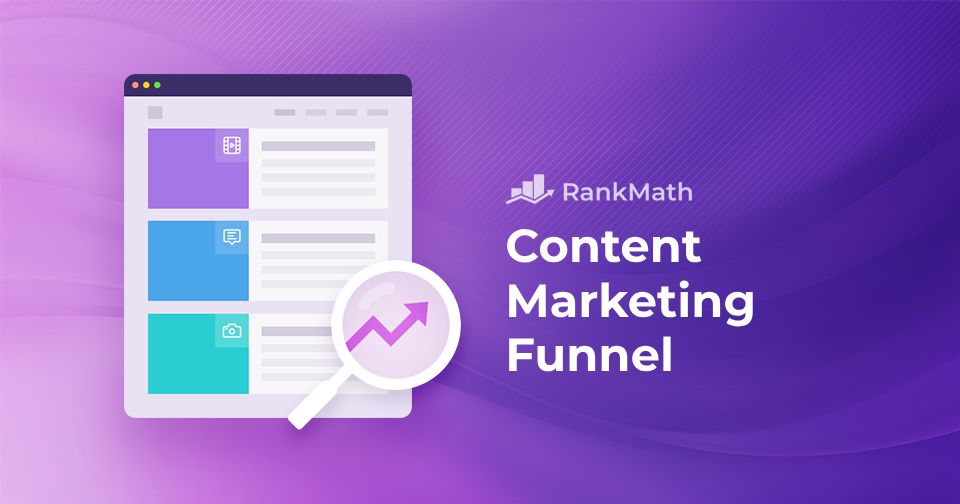Content marketing has become a cornerstone of successful business strategies.
However, creating content alone is not enough to drive meaningful results. You need an effective content marketing funnel to utilize the power of content marketing and convert leads into loyal customers.
In this post, we’ll discuss the stages of a content marketing funnel and share tips to build one to drive engagement and conversions.
So, without any further ado, let’s get started.
Table Of Contents
1 What is a Content Marketing Funnel?
A content marketing funnel is a strategic framework that guides you through the stages of the buying journey by delivering relevant and valuable content at each step.
TOFU, MOFU, and BOFU are terms used to describe different stages of the marketing funnel, each representing a distinct level of audience awareness and engagement.
- Top of the Funnel (TOFU): This stage focuses on creating awareness of the problem you can solve. The content here aims to capture the attention of potential customers and make them aware of their needs or challenges.
- Middle of the Funnel (MOFU): At this stage, the goal is to generate interest in your products or services. Content is designed to nurture leads and provide them with more targeted information to help them consider their options and make informed decisions.
- Bottom of the Funnel (BOFU): Here, the focus is on persuading prospects to become customers. Content is highly targeted and aims to address any remaining objections, providing the final push needed to convert leads into paying customers.
2 Stages of Content Marketing Funnel
Let us now discuss the stages of the content marketing funnel.
2.1 Top of the Funnel Content (TOFU)
TOFU represents the top or beginning stage of the content marketing funnel, focusing on creating awareness and attracting a wide audience.
At this stage, the audience may not be familiar with your brand or the problems they’re facing. The goal is to capture the attention of potential customers and make them aware of their needs or challenges.
TOFU content aims to educate and entertain rather than directly promote products or services.
Examples of TOFU content include blog posts, social media posts, infographics, and educational videos.
Creating TOFU Content
Research your target audience to understand their demographics, interests, and pain points. This insight will help you create your content to resonate with them effectively.
You can use Rank Math’s Topic Research tool to find the content ideas that best suit your audience.

TOFU content should prioritize providing valuable information or entertainment rather than directly promoting your products or services. The key is to offer content that addresses common questions or challenges your audience faces.
For instance, National Geographic’s website features stunning photography, captivating articles, and videos that educate and inspire audiences about the natural world.
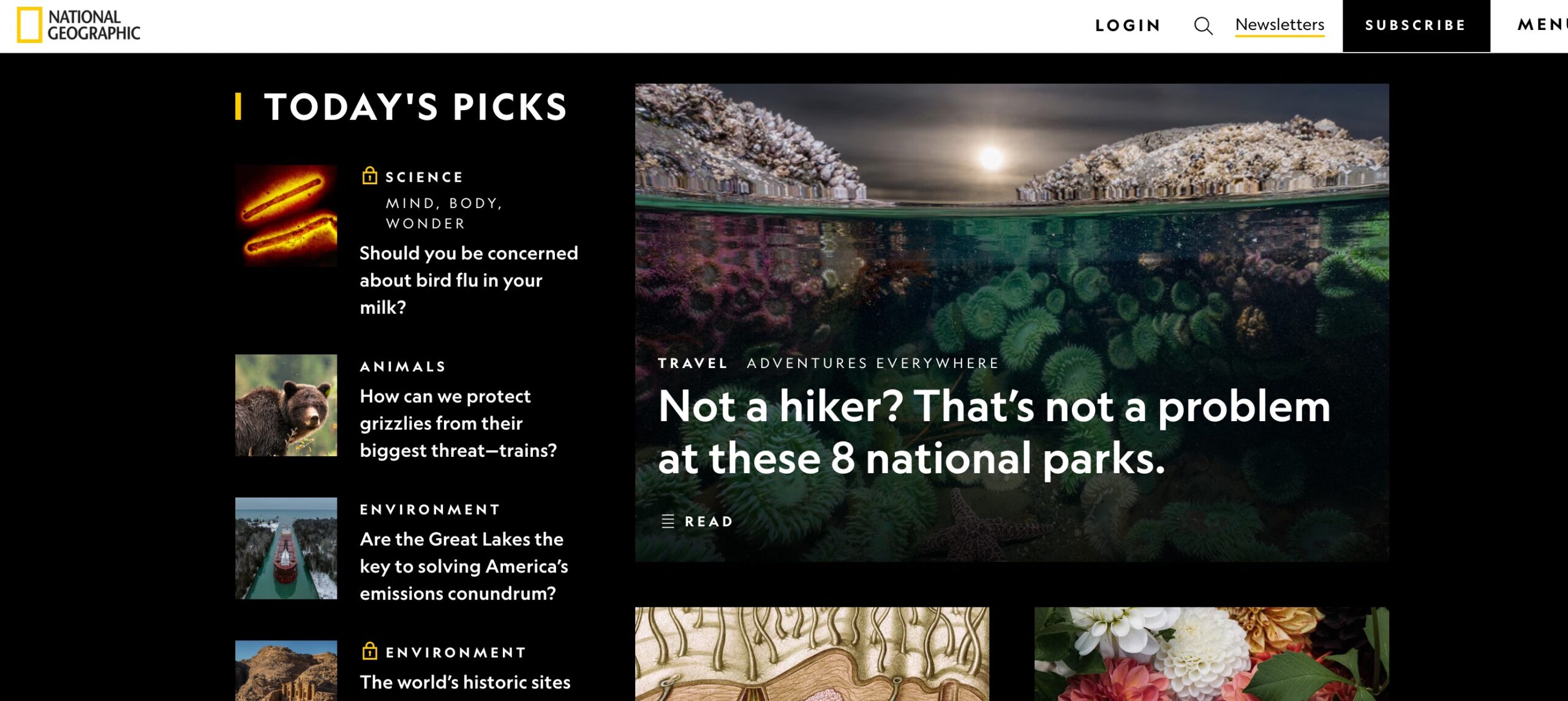
Capture your audience’s attention with compelling headlines and eye-catching visuals. Your headline should increase their curiosity and make them want to learn more.
Visuals such as images, videos, or infographics can help break up the text and make your content more engaging.
2.2 Middle of the Funnel Content (MOFU)
MOFU is the middle stage of the funnel, where the audience has moved beyond mere awareness and is now showing interest in solving their problem.
In this stage, the focus shifts to nurturing leads and providing them with more targeted content that helps them consider their options and make informed decisions.
MOFU content includes case studies, webinars, eBooks, and product comparison guides. The goal is to build trust and credibility while guiding leads toward a decision.
Creating MOFU Content
To generate ideas for MOFU (Middle of the Funnel) content, consider the factors your customers research before purchasing. For instance:
- Which brand is the best fit for me?
- What type of product or service suits my needs?
- What are the benefits of upgrading?
Addressing these questions can establish trust with valuable prospects and steer them toward a purchasing decision.
While it’s acceptable to highlight the benefits of your offering and how it stands out from competitors, providing impartial advice is also important for building trust with your audience.
Host webinars or online workshops on specific topics or provide training related to your products/services. These interactive sessions allow you to engage with leads and demonstrate your expertise more personally.

The middle of the funnel is an ideal stage for lead generation because audiences here are more open to providing their contact information in exchange for access to high-quality content. You can then nurture these leads by maintaining relationships and guiding them toward the bottom of the funnel.
2.3 Bottom of the Funnel Content (BOFU)
BOFU represents the bottom stage of the funnel, where leads are ready to make a purchase decision.
At this stage, the focus is on converting leads into customers by providing them with the information and incentives they need to take action.
The goal is to address any remaining objections and provide the final push needed to convert leads into paying customers.
BOFU content is highly targeted and may include product demos, free trials, customer testimonials, and special offers.
Creating BOFU Content
Your content should be geared towards converting leads into customers at the bottom of the funnel. This means highlighting the specific benefits and features of your products or services and demonstrating how they address your audience’s needs or pain points.
Provide special offers, discounts, or promotions to encourage leads to act and purchase.
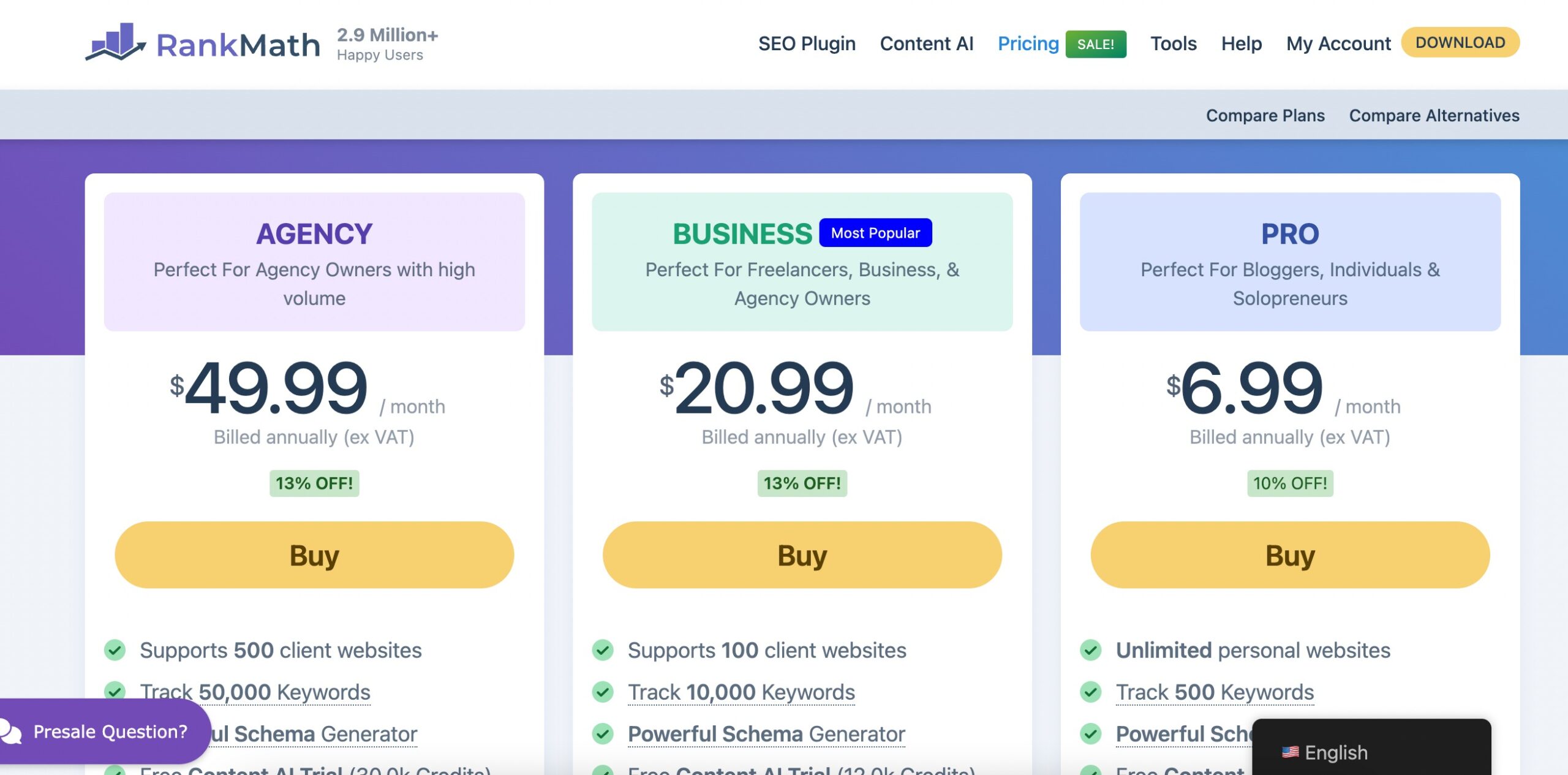
Limited-time deals or exclusive offers can create a sense of urgency and encourage leads to buy now rather than later.
Use clear and compelling CTAs throughout your content to encourage leads to take the next step, whether it’s making a purchase, scheduling a demo, or signing up for a free trial. CTAs should be specific, action-oriented, and easy to follow.
Make it easy for leads to contact customer support if they have questions or need assistance with the purchase. Responsive and helpful customer support can further reinforce trust and confidence in your brand.
After a purchase is made, continue to engage with customers through post-purchase content, such as thank-you emails, helpful resources, and exclusive offers. This helps nurture the customer relationship and encourages repeat business and referrals.
3 5 Tips to Build a Content Marketing Funnel
Now that you’re aware of the different stages of the content marketing funnel, we’ll discuss a few tips to build one.
3.1 Understand Your Target Audience
Understanding your target audience is important for creating effective content.
Conduct thorough research to identify their demographics, interests, pain points, and preferred communication channels.
Google Analytics 4 offers valuable insights into your target audience’s demographics, interests, behavior, and more.
GA4 focuses on the user-centric measurement, allowing you to analyze the entire user journey across multiple devices and platforms. This provides a more holistic view of how users interact with your brand, from their first touchpoint to conversion.
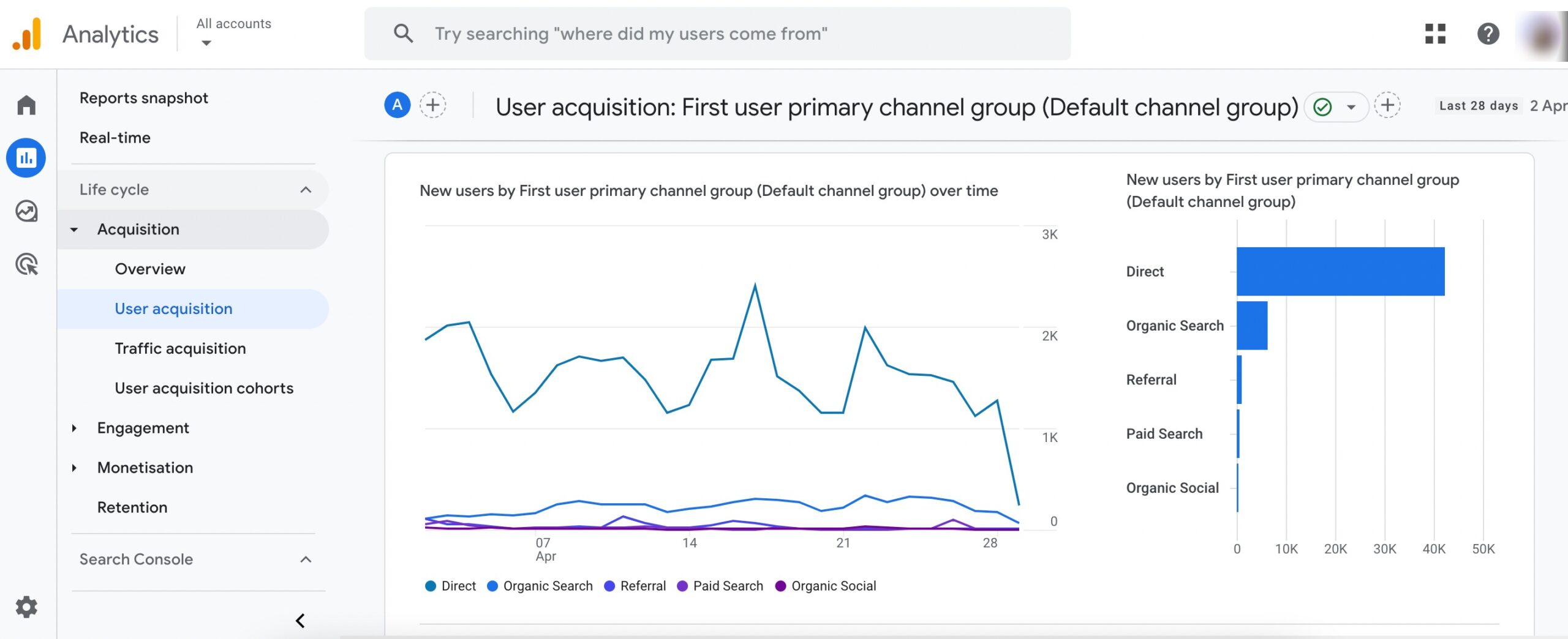
For instance, let’s say you run an online fitness coaching business targeting busy professionals. By knowing your audience, you recognize that they’re likely busy, health-conscious individuals looking for convenient and effective ways to stay fit. With this understanding, you can create content that addresses their needs and interests.
Your TOFU content can include blog posts on 10 Quick Workouts for Busy Professionals or Healthy Snack Ideas for the Office.
In the MOFU stage, you can offer an eBook titled The Busy Professional’s Guide to Fitness: How to Stay Active With a Busy Schedule.
Finally, in the BOFU stage, you can provide testimonials from satisfied clients who have achieved their fitness goals with your coaching program.
3.2 Conduct Keyword Research
Conducting keyword research is an important step in building a content marketing funnel, as it helps identify the topics and terms that your target audience is searching for online.
By understanding the keywords they use, you can create content that aligns with their interests and needs, ultimately driving more traffic to your website and attracting potential customers.
You can use tools such as Google Keyword Planner, Ahrefs, Semrush, and others to help you find the right keywords for your content.
Although Rank Math is not a dedicated keyword research tool, it helps you discover more keywords by pulling in automatic keyword suggestions from Google.
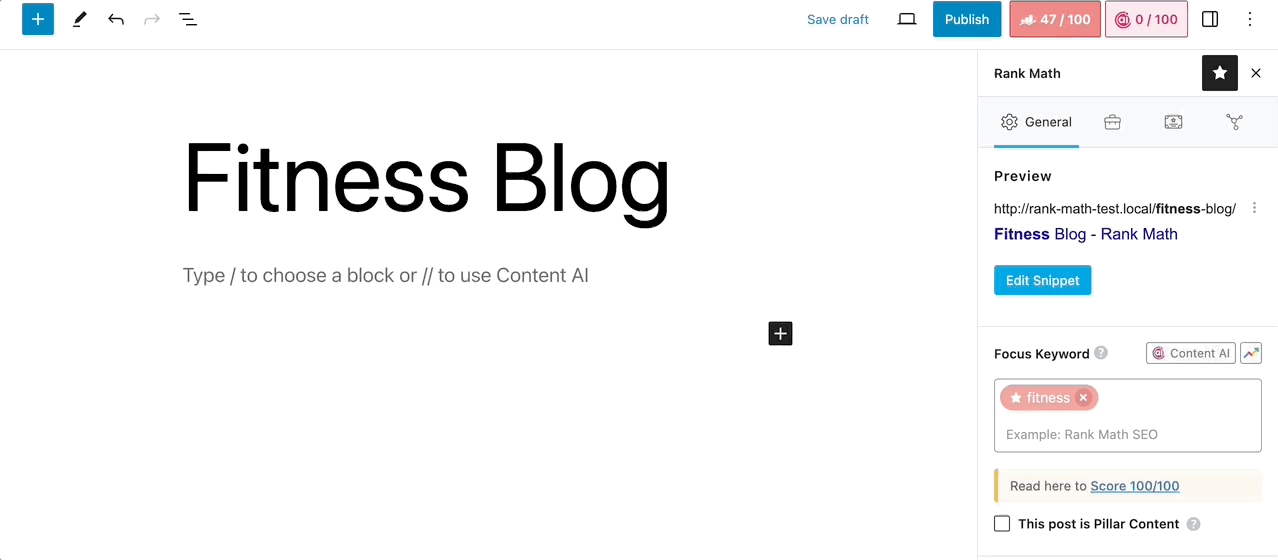
Refer to our dedicated tutorial on keyword research to perform keyword research for your content marketing funnel.
3.3 Perform Competition Analysis
Performing competition analysis allows you to gain insights into what your competitors are doing well and identify opportunities for differentiation and improvement.
By understanding your competitors’ strategies, content, and performance, you can refine your own approach to attract better and engage your target audience.
In Rank Math, the SEO Analyzer allows you to inspect your competitor’s web pages and gain valuable insights into their SEO strategy.
If you’re using Rank Math PRO, navigate to Rank Math SEO → SEO Analyzer → Competitor Analyzer from your WordPress dashboard. Once done, enter your competitor’s URL into the field and click Start Audit, as shown below.
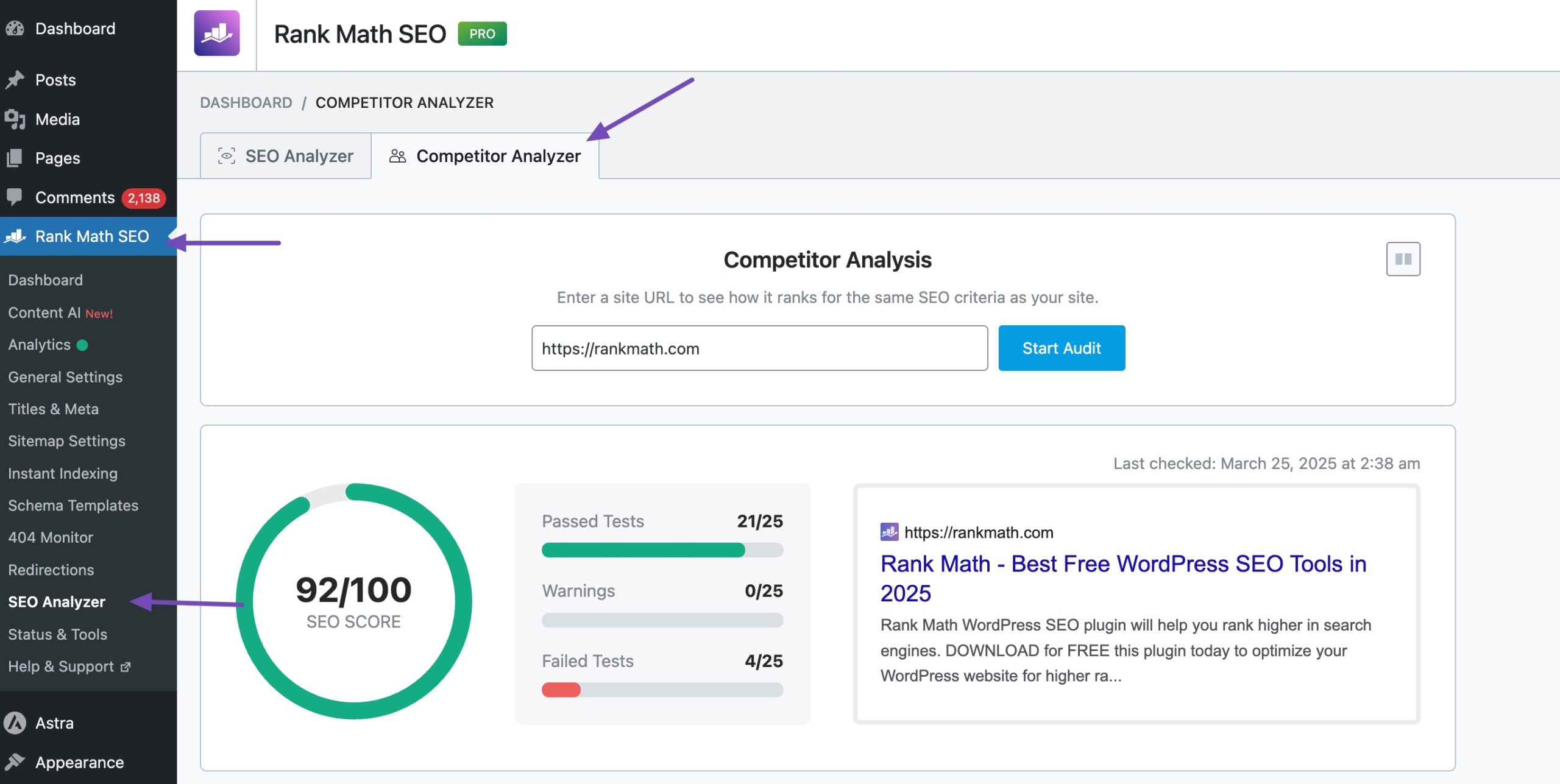
The SEO Analyzer will run a series of tests on your competitor’s URL and return with the results.
You can also compare your site’s performance with that of your competitor side by side. To do so, click the side-by-side comparison icon, as shown below.
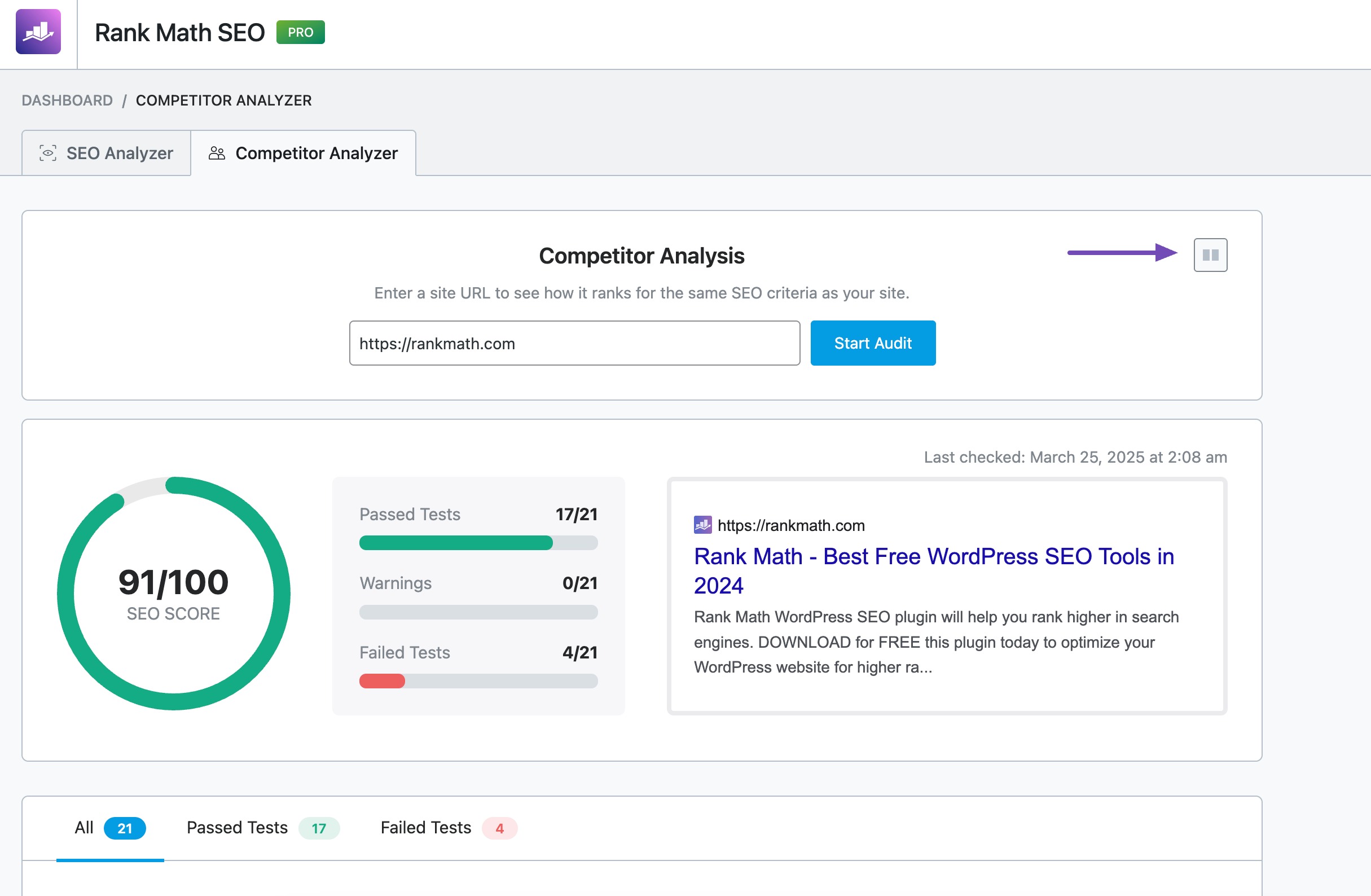
Refer to our dedicated tutorial on competitive analysis to analyze your competitor’s content.
3.4 Optimize For Search Engines
Optimize your content with targeted keywords, meta tags, and headings to improve search engine results page (SERPs) visibility.
Focus on creating high-quality, valuable content that addresses user intent and provides solutions to their queries.
We surveyed over 700 WordPress SEO professionals and found that 47% of users are producing content faster, and 35% are shifting their focus from quantity to quality with the help of AI.

You can use Rank Math’s Content AI to create high-quality content.
Also, you can easily optimize your content with Rank Math PRO’s Search Intent feature, which identifies the search intent of your primary keyword. Click the Show Intent button to view its intent or reorder keywords to analyze another one.
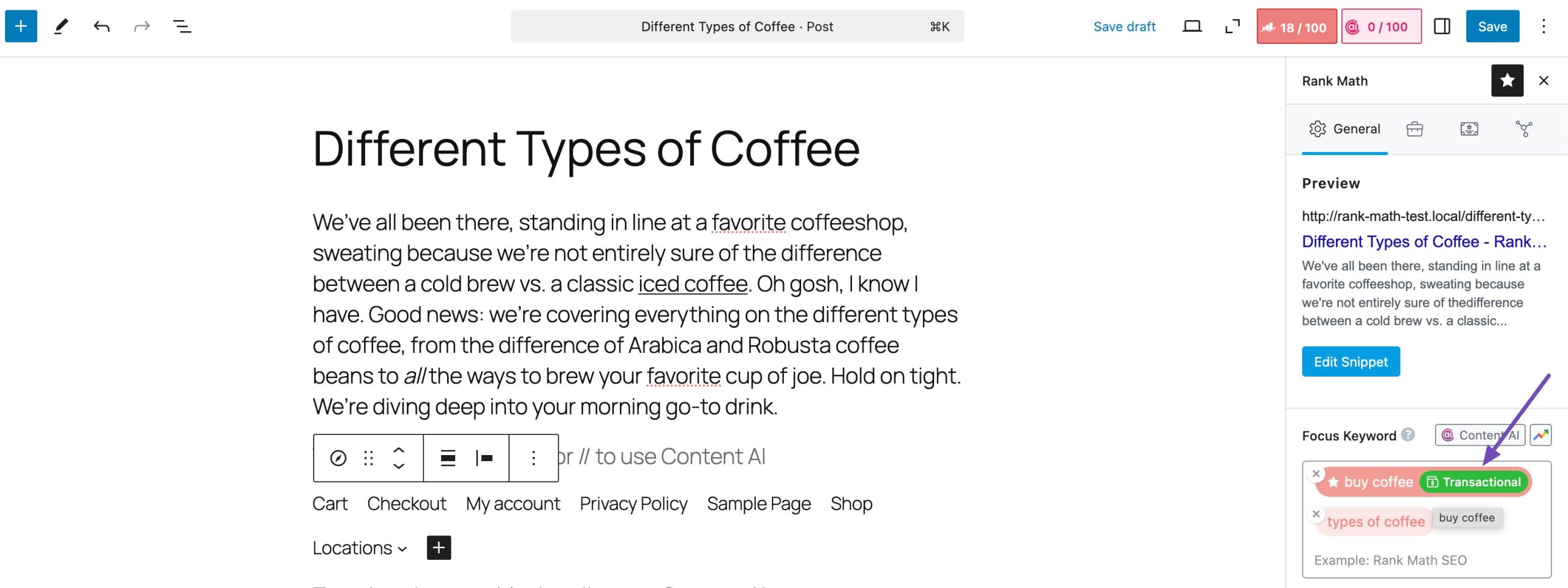
3.5 Build Customer Loyalty
You must offer content that adds value to your customers’ lives beyond just promoting your products or services. Provide helpful tips, how-to guides, educational content, and entertaining stories that address their needs and interests.
Provide exclusive content or benefits to your loyal customers as a way to reward them for their continued support.
Respond promptly to their questions, comments, and feedback, and actively engage with them to show that you value their input and appreciate their business.
Regularly show appreciation for your customers’ loyalty through thank-you messages, exclusive offers, and personalized gestures. Making your customers feel valued and appreciated strengthens their emotional connection to your brand.
4 Analyze the Content Marketing Funnel Results
Analyzing the results of your content marketing funnel is essential for understanding its effectiveness and making informed decisions to optimize your strategy.
You can track several key metrics at each stage of the funnel to understand the performance and identify areas for improvement.
At the top of the funnel (TOFU), you can analyze metrics such as website traffic, page views, and social media engagement to assess the reach and awareness of your content. Look at how many people discover your content and engage with it to understand its effectiveness in attracting new leads.

In the middle of the funnel (MOFU), focus on metrics like email open rates, click-through rates, and lead generation to measure engagement and interest. Track how effectively your content nurtures leads and guides them to the next stage of the funnel.
At the bottom of the funnel (BOFU), measure conversion metrics such as conversion rate, sales, and number of transactions made to assess the impact of your content on driving revenue and acquiring new customers.
To measure the overall effectiveness of your content marketing funnel, consider tracking metrics such as lead-to-customer conversion rate, customer lifetime value (CLV), and return on investment (ROI).
5 Frequently Asked Questions
Should every business use a content marketing funnel?
Yes, any business that wants to guide its audience from discovery to conversion can benefit from a content marketing funnel aligned to its audience and goals.
How do I measure the effectiveness of my content funnel?
Track metrics like organic traffic, engagement (time on page, bounce rate), lead generation, conversion rates, and customer lifetime value to evaluate how well each stage performs.
How often should I update my content funnel strategy?
Review your funnel regularly (quarterly or biannually) to incorporate changes in audience behavior, search trends, product updates, and industry shifts.
Do I need separate landing pages for each funnel stage?
Not always, but targeted landing pages help improve clarity and conversion, especially for the consideration and decision stages.
6 Conclusion
Building an effective content marketing funnel is essential for attracting, engaging, and converting leads into loyal customers.
By understanding your audience, creating valuable content at each stage of the funnel, and optimizing for search engines, you can effectively guide prospects through their buyer’s journey.
Remember to regularly analyze your metrics, experiment with different tactics, and iterate on your approach to continuously improve the effectiveness of your content marketing funnel.
With a well-created strategy and the right tools in place, you can create a content marketing funnel that drives meaningful results and contributes to the growth of your business.
If you like this post, let us know by Tweeting @rankmathseo.
